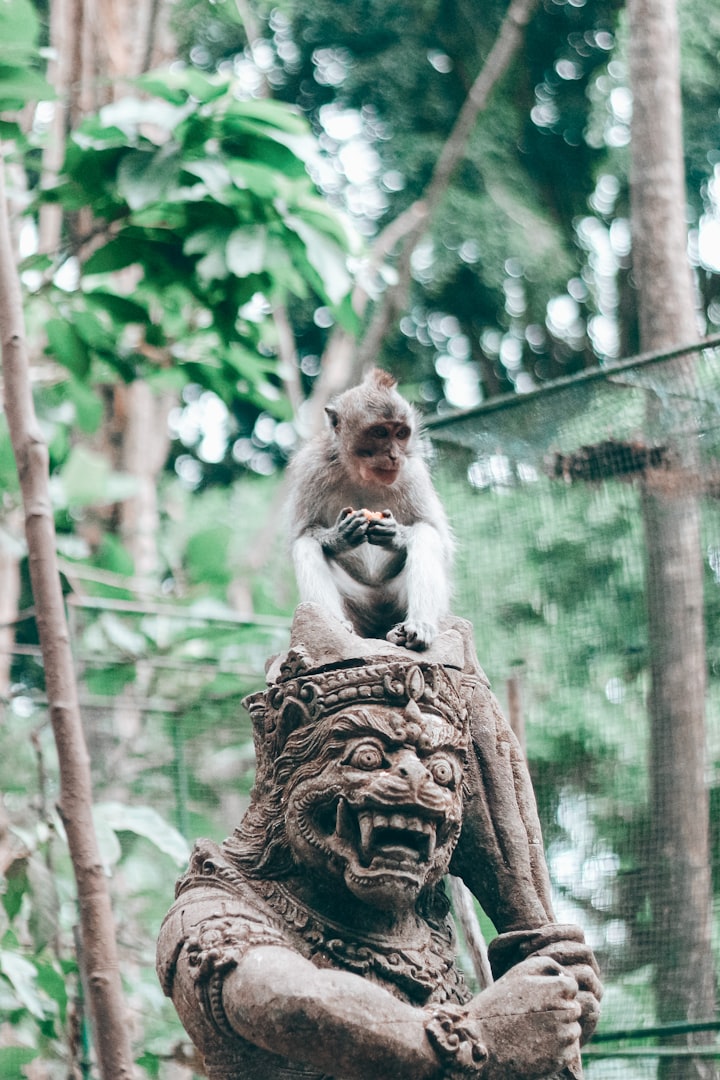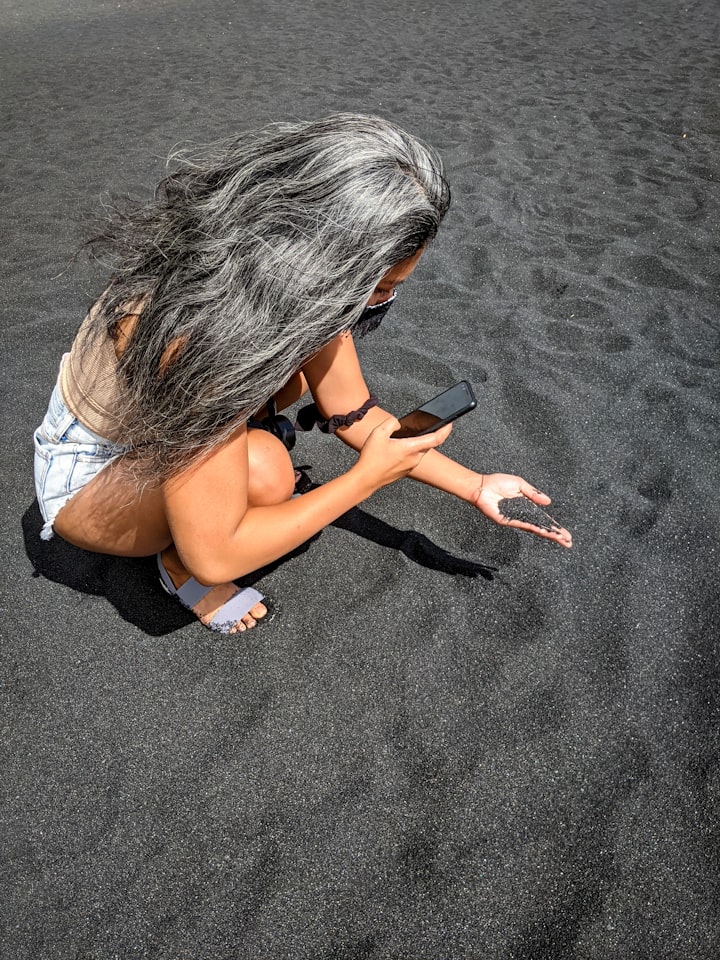Siri, Why Do Monkeys Show Their Teeth?
Stirring up trouble in Ubud's Sacred Monkey Forest

I was driving through Ubud's Sacred Monkey Forest on my motorbike when I saw a mother macaque, grooming a young monkey, while three others waited their turn. The family was perched on top of one of the wire fences that separate the concrete walking path from the rest of the forest.
The Sacred Monkey Forest Sanctuary is a 12.5 hectare wooded park on the edge of Ubud that's home to three active Balinese temples and over 700 long-tailed macaques, a monkey species found across Southeast Asia.
Before the pandemic, thousands of tourists filled this park daily, feeding bananas to the monkeys and taking photos.
Now the dense forest is empty and still, the quiet broken only by the distant sound of a macaque hooting, a bird calling or the occasional vehicle passing nearby on Monkey Forest Road. The people I see when I ride through are just the park staff in their dark green uniforms, sweeping paths and feeding the monkeys.
I stopped my bike (which you're not really supposed to do, but everyone does anyway) and watched the family for a few minutes. The waiting monkeys were clearly getting bored and restless. The one on the far right of the line started to make faces.

Without thinking, I started to unzip my bag to pull out my phone for a photo. The monkey on the right looked directly over at me.
You have to be really careful about opening your bag around macaques. The monkeys have learned that bags contain treats and they're not shy about taking them. There are signs posted all along the trails warning people to “take care of your stuff" and you never, ever walk through with plastic shopping bags.

The monkeys' innate fear of humans has been voided by constant contact. I've watched tourists reach for a water bottle or a snack only to have a monkey run over and grab it. These macaques are smart and observant. I've heard stories of them grabbing sunglasses, wallets and keys. And smart phones.
I stopped moving. The monkey lost interest and looked away.
Quietly, bit by bit, I finished opening the side pocket. I stealthily withdrew my phone and took a picture.
The monkey on the end was making faces. He'd opened his mouth and was sticking his tongue out. At me, I wondered? After all, these monkeys are (or were) used to tourists. I snapped a quick photo and smiled at him in response. The monkey smiled back at me. At any rate, he was pulling his lips back. It looked like a smile. Sort of.

He slowly bared his teeth. Do monkeys actually smile? He didn’t look that friendly. Was I misinterpreting what I was seeing? Since I had my smartphone in my hand, I asked (Apple's AI assistant) Siri to check why monkeys show their teeth.
The first article on the list that Siri found was "How Did the 'Smile' Become a Friendly Gesture in Humans?" Uh, oh, I thought. Why is smile in quotes? I skimmed the article. Briefly: "In primates, showing the teeth, especially teeth held together, is almost always a sign of submission. The human smile probably evolved from that."
I looked back at the young monkey. His lips had curled all the way back. His teeth were most definitely not together. I was pretty sure he wasn't submissive.
I read on: "In the primate threat, the lips are curled back and the teeth are apart -- ready to bite." Oh, like he's doing right now, I thought.
I snapped another photo of the non-smiling, non-submissive monkey.
Luckily, my furry nemesis was several feet away from me, on top of a fence. Maybe he wasn't really being aggressive. Maybe he was just bored. The mother macaque was still calmly picking through fur and wasn't paying any attention to me. Surely, if she wasn't worried, then I didn't represent a clear threat.

I was glancing at the list of articles when I saw, half-way down, a headline that read: "What To Do If You're Attacked By Monkeys." I clicked on the link. Turns out, it's a really bad idea to make eye contact or smile with your teeth showing if you're around macaques, as these are classic signs of aggression for non-human primates. Uh, oh. I'd locked eyes with the monkey and I'd been grinning at him.
I'd unwittingly triggered an aggressive response.
Apparently, if a monkey is planning to attack you, he or she will give you plenty of warning first. They will look you in the eyes, open their mouths and bare their teeth. Check, check and check.
I read on. If the baring of teeth and curling of lips hasn't worked, a monkey will give a warning grunt and then do a mock lunge towards you. Apparently, it can be scary enough to make you fall off a balcony.
I looked back at the young macaque and accidently locked eyes again. He grunted and made a lunging movement in my direction.
The grunt. The feint. It was time to go.
I snapped a last hasty shot and slipped the phone back in my bag.

I swung my leg over my motorbike and hit the starter. The movement and sound startled my small monkey opponent. He squawked in fear and half-slipped off the fence. The mother growled in irritation, reached out a paw to bat him gently and went back to hunting fleas.
As I shifted gears and drove away, I realised that I had been bluffed by a teenager. Well played, Junior, I thought, well played.
***
Epilogue: That evening, tucked up in my favorite chair with a steaming cup of hot tea, I was once again on my phone. This time, I was practicing Indonesian on the language learning app DuoLingo, when a phrase about monkeys appeared.
You can't make this stuff up.

Thanks for reading my story! I had a lot of fun writing it. Please share the love and give my story a ❤️ if you enjoyed it. And if you really liked it, please leave me a small tip. I will buy some bananas and take them to the monkeys, without smiling or making eye contact, of course.
About the Creator
Liz Sinclair
Amateur historian who loves travel and lives in Asia. I write 'what-if' historical stories, speculative fiction, travel essays and haiku.
Twitter: @LizinBali. LinkedIn: sinclairliz






Comments
There are no comments for this story
Be the first to respond and start the conversation.